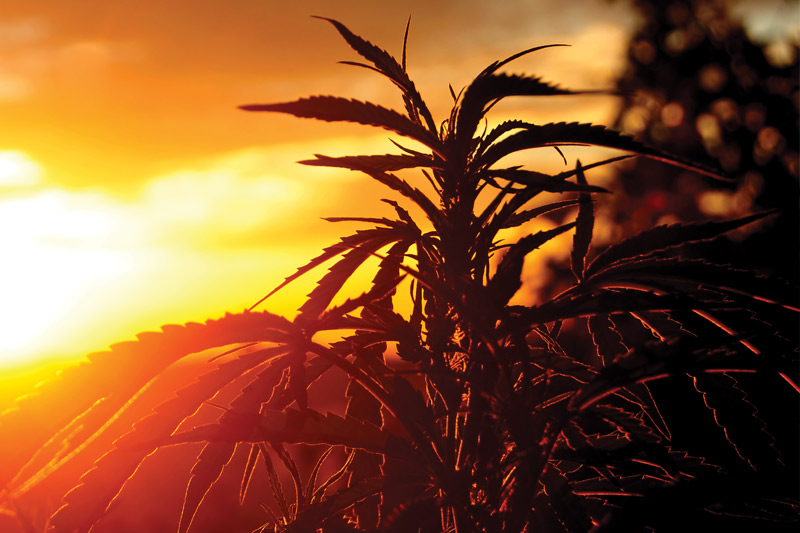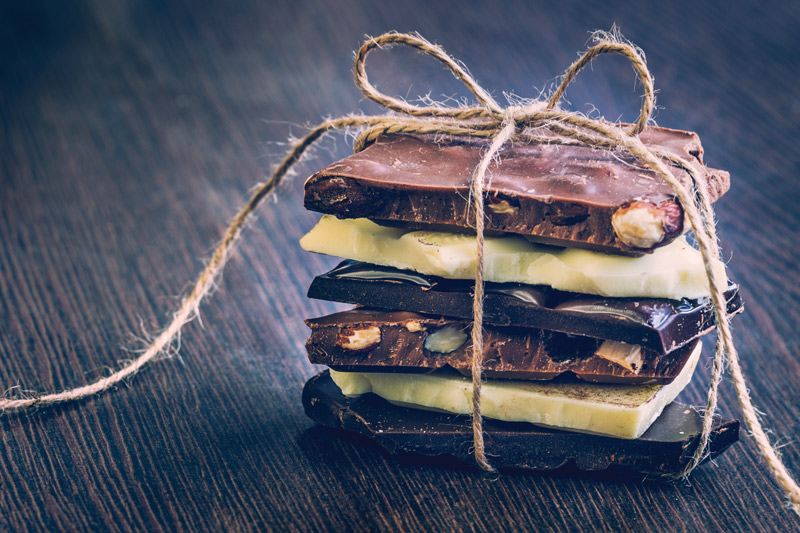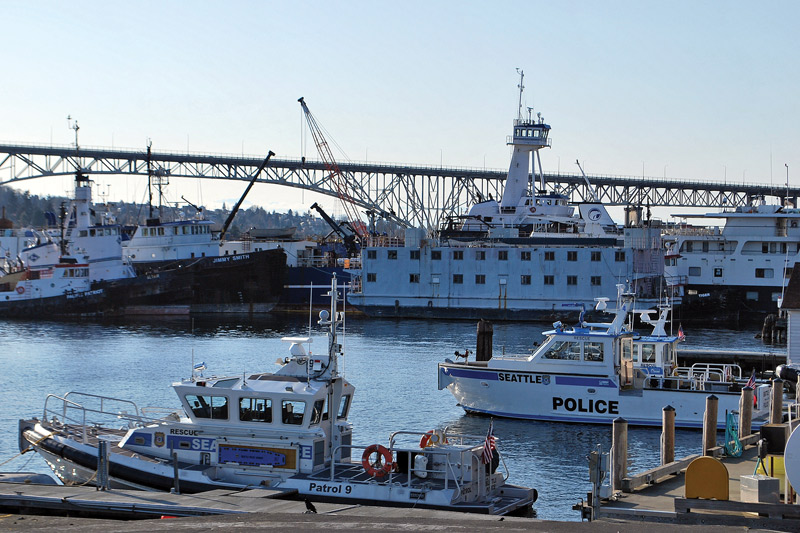
 As a responsible boater, you should be familiar with the laws involving marijuana usage to know what risks you are exposed to as a boater or, more significantly, as a boat owner.
As a responsible boater, you should be familiar with the laws involving marijuana usage to know what risks you are exposed to as a boater or, more significantly, as a boat owner.
For example, even if you do not use, there is a high likelihood at some point that one of your guest or invitees will bring—legally under Washington state law—marijuana onto your boat. That guest or invitee will be placing you at some risk, especially if your boat is boarded and searched by the U.S. Coast Guard (USCG).
Public opinion on recreational use of marijuana has shifted substantially. According to a 2017 Gallup poll, 64 percent of Americans think marijuana should be legalized for recreational use. Washington is one of eight states, including Alaska, California, Colorado, Massachusetts, Maine, Nevada, and Oregon, as well as the District of Columbia, that have legalized certain recreational uses of marijuana. There are more states that may decide to legalize the recreational use of marijuana, most likely the Western states of Arizona and Montana.

If you are on the waters of Washington or Oregon, you are in a state that has legalized recreational and medical use of marijuana. However, if you are on a boat on the navigable waters of the United States, you are exposing yourself to a violation of federal law and the resulting penalties for that violation. The conflicting powers of state vs. federal law is a source of confusion regarding recreational marijuana use.
Small amounts of marijuana aboard that is legal under state law is generally left to the state enforcement authorities to regulate, and that legal use is not a federal enforcement priority. To understand the rights and risks of using marijuana as a boater , you must comprehend the state law in which you are boating and the current federal law.
Washington recreational use law is a good example of state powers at play, and the law of other states that have legalized marijuana are similar with some variations. In Washington, only adults age 21 years and older can purchase and possess up to one ounce of useable marijuana (the bud), 16 ounces of marijuana infused edibles in solid form, 72 ounces in liquid form, or seven grams of marijuana concentrates.
Selling and buying marijuana is strictly regulated in Washington. It can only be sold and purchased at state-licensed retail stores. A valid photo ID is always required and no one under 21 is allowed on a retail premises. It remains a felony for anyone not a licensed retailer to sell or provide marijuana to anyone else. Providing or selling marijuana to a minor under the age of 18 can result in up to ten years in prison and up to a $10,000 fine.
The many variables at play with regards to marijuana usage are compounded aboard. It is illegal to consume marijuana in view of the public, and it is illegal to operate a vessel under the influence of marijuana if you have concentration of five nanograms (ng) or more of active THC (the main psychoactive chemical in cannabis is delta-9-tetrahydrocannabinol, commonly known as THC) per milliliter of blood (5 ng/ml). The Washington State Liquor and Cannabis Board recommends waiting five hours before operating a vehicle, and the recommendation would be the same for operating a boat. The recommended wait time would be longer after consuming edible marijuana products.
Operating a boat under the influence of marijuana is a gross misdemeanor and could result in jail time of almost a year and a $5,000 fine. When an operator of a vessel is arrested for operating under the influence of marijuana, the vessel can be impounded, possibly triggering a lengthy and costly procedure.
Finally, taking marijuana outside the state of Washington (for example, taking marijuana to the nearby inland waters of Idaho, a non-recreational using state) is illegal at all levels of government and could result in significant penalties.
If you are caught using marijuana illegally by Washington authorities, you might receive a ticket or citation and pay a fine. The penalties increase if you are caught selling to people under the age of 21, and growing, buying, and/or selling without a state license.
Federal law differs from Washington law concerning the recreational use of marijuana, and Washington law does not preempt federal law. Anti-use federal and pro-use state laws appear to be going in different directions under the current federal Attorney General Jeff Sessions. The production, distribution, sale, possession, and use of marijuana are still prohibited under federal law and may be prosecuted under the law of the United States.
Recreational use is illegal under federal law everywhere in the United States, but your risk in the state of Washington will be greater on the navigable waters of the United States, including inland rivers, national parks, and national forests, because of federal jurisdiction and authority in those areas. Tribal lands may also have different policies concerning the use of marijuana and its possession.
1996: California becomes the first state to legalize medical marijuana use. This is the first example of marijuana legalization in the United States.
1998: Alaska, Oregon, and Washington become the next states to legalize medical marijuana.
1999-present: States continue to legalize medical marijuana. At the time of this writing, a total of 29 states and the District of Columbia have legalized medical marijuana use.
2012: Colorado and Washington become the first states to legalize recreational use of marijuana.
2014: Alaska, Oregon, and the District of Columbia also
legalize recreational use.
2016: California, Maine, Massachusetts, and Nevada legalize recreational use. At the time of this writing, this brings up the number of recreational use states to eight plus the District of Columbia.
2016-17: States have continued to legalize medical marijuana with the latest being Arkansas, Florida, North Dakota, Ohio, and Pennsylvania in 2016. Most recently, West Virginia joined the medical use states in 2017.
The federal government regulates drugs through the Controlled Substances Act (CSA) (21 U.S.C. § 811), which does not recognize the difference between the medical and recreational uses of marijuana. These laws are generally applied only against persons who possess, cultivate, and/or distribute large quantities of marijuana.
Under federal law, marijuana is treated like other controlled substances, such as cocaine and heroin. The federal government places every controlled substance in a schedule, according to its relative potential for abuse and medicinal value. Under the CSA, marijuana is classified as a Schedule I drug, which means that the federal government views marijuana as highly addictive and having no medical value. Doctors may not legally “prescribe” marijuana for medical use under federal law, though they can “recommend” its use under the First Amendment.
As recently as November 2017, Attorney General Sessions indicated there might be a shift toward more vigilant enforcement of the current federal marijuana laws. Under the previous administration, there was a directive, laid out in the Cole Memorandum, that adopted the approach of deferring to the state law regarding lower level marijuana enforcement.
Sessions recently said, “It’s my view that the use of marijuana is detrimental, and we should not give encouragement in any way to it, and it represents a federal violation, which is in the law and it’s subject to being enforced, and our priorities will have to be focused on all the things and challenges we face.” He added, “We’ll be working our way through to a rational policy. But I don’t want to suggest in any way that this department believes that marijuana is harmless and people should not avoid it.”
The U.S. Attorney’s office in Western Washington and federal law enforcement are still guided by the Cole Memorandum, which has not been replaced. This memorandum was prepared in August 2013 by the Office of the Deputy Attorney General at the Department of Justice, and was intended to give guidance to all United States attorneys regarding marijuana enforcement, mainly in states with legalized marijuana. The memorandum establishes or recognizes certain enforcement priorities that are particularly important for the federal government.
The memorandum recognizes that the Department of Justice has not historically focused resources toward prosecuting people who possess and use small amounts of marijuana on private property. It also recognized that the federal government will leave the lower level enforcement to local authorities unless the marijuana activities threaten harm to the federal enforcement priorities.
While reserving complete prosecutorial discretion, the memorandum provides that state enforcement would remain the primary means of addressing marijuana-related activities in those states such as Washington that have enacted laws legalizing marijuana in some form and have implemented a strong and effective regulatory enforcement system.
According to the directive, this means that the primary enforcement of the use of small amounts of marijuana on board a boat will likely be left to the state enforcement authorities, and that legal use under state law will not be a priority of the federal enforcement authorities.
The USCG’s position and requirements are that it enforces federal laws on federally navigable waterways of the U.S along with federal partners under the guidance of the Department of Justice. Commercial operators, operators of federally inspected vessels, and the public are required to comply with all federal laws and regulations.
Under the Maritime Drug and Law Enforcement Act, the transportation of a significant amount of a controlled substance, regardless of its form, is illegal. Boating under the influence of alcohol or a controlled substance in the states of Washington and Oregon is illegal and can result in an arrest and a DUI (Driving Under the Influence charge). If the USCG encounters marijuana or marijuana product in volumes larger than for personal use, it will follow the federal procedures for taking law enforcement action in cases involving controlled substances.
The USCG is generally concerned with two categories of violations: illegal commercial sale of marijuana, and operating under the influence. The USCG often coordinates with law enforcement partners when marijuana is discovered in violation of federal law, and may take any of several actions, including issuance of violations or referral to the Department of Justice for prosecution, depending on circumstances. The USCG most often coordinates with state police and local authorities as appropriate, especially in cases of operator impairment.

The USCG’s position is in line with the rest of the federal government; state laws have not altered federal laws prohibiting the manufacture, production, distribution, possession, or use of marijuana. Marijuana remains illegal under federal law, and the USCG will continue to enforce federal laws and regulations within its jurisdiction.
Obviously, the concern and risk for recreational users aboard is the illegality under federal law and the broad authority of the USCG to board and inspect your boat. The USCG does not need probable cause to board and inspect your boat. This means that you must be prepared for a boarding at any time from both a safety and an illegal substance perspective. If you are going to possess and use marijuana on board a boat, you need to recognize this risk. You should make sure your guests understand this risk, even if you are not a marijuana user, so you and your guest are not surprised if marijuana should be found on board the boat.
If you are on your boat or a friend’s boat in a marina, you should give thought to what that marina’s policy is concerning the use of marijuana. Almost all marina moorage is governed by contract and rules incorporated into that contract. Most marinas in Washington have no rule against the legal use of marijuana under state law. Marinas are generally addressing marijuana like alcohol: you must obey the state law and not bother your neighbors.
As a boater in the Northwest, you need to think about the risks of taking marijuana into Canada. It is illegal under Washington law to take marijuana to Canada, even if it is legally possessed under Washington state law. If you are boating in the Pacific Northwest with legal marijuana on board, you are committing a crime if you take it into Canada.
Regarding Canada, it is moving quickly toward being the second country in the world, after Uruguay, to have nationwide legalization of recreational marijuana use, with a target date of not later than July 1, 2018. It would then be like Washington state, but the entire country would be on the same page, unlike here in the U.S. where some states have legalized marijuana and others have not.
In summary, due to the legality of marijuana under Washington state law and the pervasiveness of the number of people who use marijuana products, you as a boater have some risk of federal enforcement if using marijuana.
You should take reasonable steps to limit that risk and not flaunt that use in front of the USCG or other federal authorities, and take steps to inform your guests and invitees of this risk. If you are stopped for your use, and if legal under Washington law, the penalty would likely be fairly light. All boaters, as with all legal users of marijuana, should be aware of any shift in federal enforcement policy that might increase the legal risks of using marijuana while aboard.
At the end of the day, you’re the captain of your vessel and you make the decisions. The feeling of freedom and autonomy are why we love boating, no? Whether you’re pro, anti, or neutral to marijuana usage, knowing the law and your rights is as important as knowing the Rules of the Road. Stay informed and continue to create fun, safe memories here in
boating paradise.